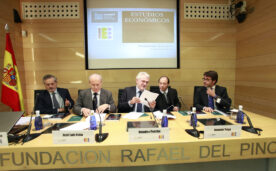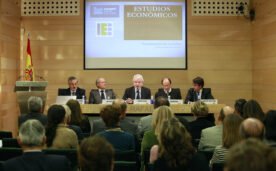On 14 November 2012, the launch of the IEE Magazine took place. "Corporate Social Responsibility at the Rafael del Pino Foundation.
Speakers at the event included:
D. Amadeo PetitbòDirector of the Rafael del Pino Foundation
Mr. José Luis FeitoPresident of the Institute for Economic Studies
Mr Joaquín TrigoDirector General of the Institute for Economic Studies
D. Rafael García de DiegoSecretary of the Board of Directors of Red Eléctrica de España
D. Miguel M.ª García CabaDirector of the Legal Department of the LNFP
The general view of economists for many years has been that, if prices reflect the scarcity of resources, a company's managers should focus exclusively on maximising the share price, i.e. maximising shareholder wealth. This view has been defended by prestigious economists such as Milton Friedman. However, especially from the 1960s and 1970s onwards, this restrictive view was challenged by many experts and even by society in general, although much more so in non-Anglo-Saxon countries, arguing that companies should rather be in charge of defending the interests of stakeholders or interest groups.
Defining Corporate Social Responsibility (CSR) is an arduous and complex task because it is not a physical reality but a social construct, in which each individual looks at it from the perspective of his or her knowledge, capacities and interests. However, there are several common components, such as the reference to three areas of responsibility: economic, social and environmental, without forgetting the interlocutors or stakeholders to whom the company presents itself as responsible, as well as the voluntary nature of these responsibilities. The integrated nature of Corporate Social Responsibility in the strategy is also present,
in policies and operations. Corporate Social Responsibility will therefore be that set of responsibilities that the company assumes towards society, which will change as circumstances change and as the sensitivity of the actors themselves changes.
Corporate Social Responsibility (CSR) refers to how companies are governed with regard to the interests of their employees, their customers, their suppliers, their shareholders and their ecological and social impact on society at large; in other words, to a company's management that respects all its stakeholders and involves a strategic approach that should form part of the day-to-day management of the decision-making and operations of the entire organisation, creating long-term value. Hence, it is important that both the governing bodies and the management of companies take on board the perspective of the company as a whole.
of Corporate Social Responsibility. There are two common elements in the definition of Corporate Social Responsibility: one is the voluntary nature and the fact that it must be supported by the company's shareholders; the other is that it must benefit society. Thus, it must create business benefits and be financially viable without provoking a backlash from shareholders who consider their resources to be wasted.
Currently, the massive internationalisation of economic activity, as a consequence of Globalisation, has generated problems that go beyond national borders and make it difficult for any country to satisfactorily fulfil its conventional role of ensuring that the rules of the game that regulate relations between the different economic agents are respected. Faced with this situation, different initiatives have been appearing on the international scene, promoted by different organisations, aimed at promoting Corporate Social Responsibility as a mechanism to minimise the negative consequences of the
Globalisation.
Discussions on this subject have for too long suffered from a lack of focus and practical recommendations, especially with regard to business leaders and managers, who have a responsibility to ensure that their organisations apply "moral common sense" in their day-to-day performance. But in recent years this has changed dramatically: the vast majority of leading companies have now agreed to engage in some form of responsible corporate behaviour. But in addition, and despite the conflicts of interest that this may entail, companies have no choice but to respond to the demands of new international treaties and commitments that put pressure on them to verifiably improve their corporate and responsible behaviour to protect
of human rights.
Corporate Social Responsibility can also be defined as the different mechanisms available to a company for managers to internalise the externalities that their decisions impose on third parties (stakeholders). This goes much further than pure altruism, although large multinational companies consider philanthropic actions for their own business sustainability. Thus, managers also consider it appropriate to focus their attention on strengthening and extending the capacities
of the community where they have economic or business interests, where Corporate Social Responsibility becomes a cooperative game in which all parties win. Unfortunately, too often philanthropy is part of the periphery of business. If the goal is to have the cause of Corporate Social Responsibility adopted by more actors than those who accept altruism as the only goal, the philosophy of CSR must be integrated into business management itself, creating the conditions for positive-sum games where both stakeholders and shareholders win, i.e. a win-win model.
Proponents of Corporate Social Responsibility also argue that there is a business case for the concept, in the sense that if, for example, employees are treated fairly, with training programmes and job security, the company will be able to attract the best people, as they will feel that they have established a long-term relationship with the company. The same can be said of suppliers or the community at large. However, the
The ultimate foundation of Corporate Social Responsibility is ethical in nature. Ethics requires maintaining certain criteria of behaviour on an ongoing basis. And, although the company that decides to take on a responsible strategy usually already applies it in its performance, what it now seeks is to follow a method and procedures that help to improve, that avoid mistakes, that facilitate things and that provide coherence.
This ethical basis imposes the correctness of the goals and demands that the means also pass through the filter of appropriateness. The objectives must be achieved within the time horizon considered and, if possible, should be measurable at mid-term reviews.
CSR enhances personal empowerment and enables workers to acquire key cross-cutting competences, participate in lifelong learning and develop new skills to adapt to a wider range of tasks. CSR can be a mechanism for workers to feel fulfilled, thereby increasing the productivity of companies and the economy. The absence of public and private corruption, tax evasion, an environment where
The fact that political changes have relatively little impact on the foundations of the strategy, that companies behave in a socially and economically responsible manner, and that citizens are committed to and supportive of social cohesion, all help to make things work much better.







